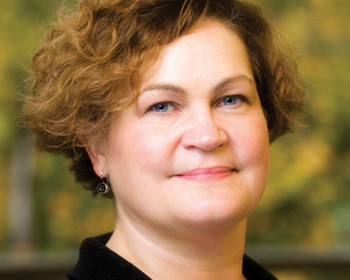Lara Skidmore ’93
Open gallery

Skidmore earned a political science degree from Oregon State University. She worked at Bonneville Power Administration and PacifiCorp after receiving her JD from Lewis & Clark. In 2007, she opened the Portland office of Troutman Sanders, an international law firm with a large energy practice, and became its Portland office managing partner.
How did you get into energy law?
After my first year in law school, I was hired into the co-op student program in the transmission contracts group at Bonneville Power Administration, which ultimately turned into a permanent job in the office of general counsel. My practice focused on transmission and power contracts and policy. I had studied a lot of engineering as an undergraduate, which helped me get the initial job at Bonneville.
In 2003, I moved to PacifiCorp, where I was the associate general counsel for transmission organization.
Finally, in 2007, I moved to Troutman Sanders. I still represent PacifiCorp, as well as other energy companies—including renewable energy companies—in administrative and judicial proceedings.
How were you able to develop a federal energy practice without moving to Washington, D.C.?
Portland is the center of energy activity in the Pacific Northwest. The city is home to two major investor-owned utilities, the headquarters for Bonneville, and several large renewable energy companies—AVANGRID Renewables, Vestas, Solar-World, EDPR—as well as many other related companies. Clients have stated that they really value the ability to have local counsel familiar with their utilities and the local energy community, but also with significant experience practicing before the Federal Energy Regulatory Commission in Washington, D.C. It was great that Troutman Sanders recognized the importance of Portland to its energy work.
In energy law… the laws and policies and markets are evolving, and most of the legal questions do not have clear answers.Lara Skidmore ’93
What do you like about practicing energy law?
I love how dynamic it is. In some other areas of law, after you practice for a while, you generally know the answer to a question because you’ve seen the issue before and the law is settled. In energy law, though, the laws and policies and markets are evolving, and most of the legal questions do not have clear answers. Several different sets of regulations—at both the federal and state levels—might apply to an issue, and there often is little or no case law to guide you. This makes practicing interesting and challenging.
You’ve seen a lot of changes in the energy sector. What do you think of them?
I feel very positive about them. In the West, there is finally some movement toward a broader energy imbalance market, which can encourage more efficient renewable resource integration. In my view, this movement toward more efficient markets will provide both economic and environmental benefits.
What advice would you give to students interested in energy law?
Be committed, write well, and be scrappy. You have to be willing to dive deeply into energy law and embrace its complexity. It’s not an area of law that you can work with on a superficial level. And it’s really important to be willing to work hard and to stick with things even when then become challenging. Students who have that tenacity and grit make great lawyers.
More Advocate Magazine Stories
email jasbury@lclark.edu
voice 503-768-6605
Judy Asbury, Assistant Dean, Communications and External Relations
Advocate Magazine
Lewis & Clark Law School
10101 S. Terwilliger Boulevard MSC 51
Portland OR 97219

